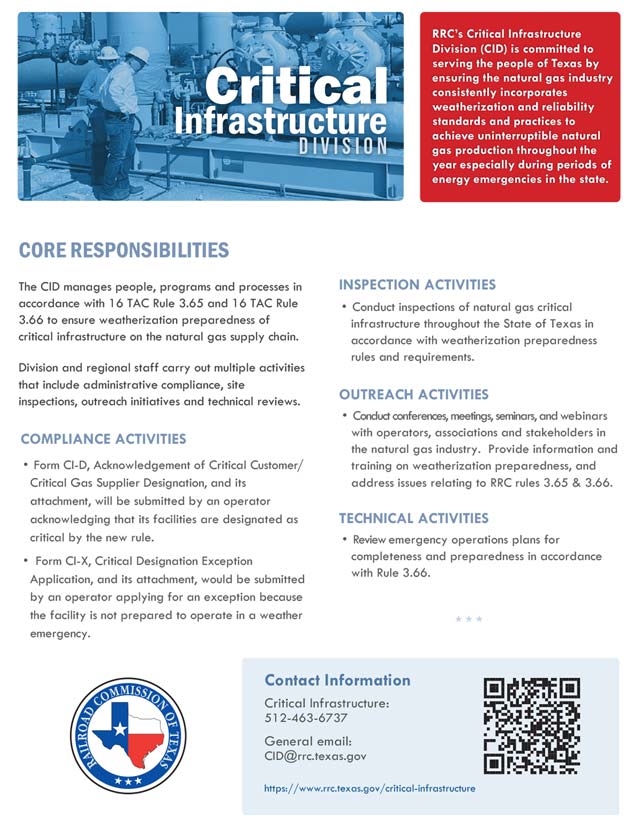Contact Information
- Critical Infrastructure Phone: 512-463-6737
- General Email: CID@rrc.texas.gov
- CID Regions by County
- CID Regional Office Information
Critical Infrastructure ANNOUNCEMENTS
Save the Dates — 2025 RRC Regulatory Conference at Kalahari Resorts & Conventions
February 20, 2025

The Railroad Commission of Texas (RRC) invites oil & gas and pipeline operators, other industry representatives and exhibitors to attend its annual conference at its new venue in 2025.
Who: Railroad Commission of Texas
What: 2025 RRC Regulatory Conference
When: Monday, July 14 - Wednesday, July 16, 2025
Where: Kalahari Resorts & Conventions, 3001 Kalahari Blvd., Round Rock, Texas 78665
Discounted room block at Kalahari Resorts will be available.
Registration and discounted room block will open in early May. To view the event webpage, visit the RRC website at https://www.rrc.texas.gov/about-us/organization-and-activities/activities/workshops-and-conferences/2025-rrc-regulatory-conference/.
What we do
RRC’s Critical Infrastructure Division (CID) is committed to serving the people of Texas by ensuring the natural gas industry consistently incorporates weatherization and reliability standards and practices to achieve uninterruptible natural gas production throughout the calendar year including periods of severe weather.
The CID will vigilantly oversee and manage adherence to weatherization rules, adopted by the RRC, including ensuring companies within the natural gas supply chain register their assets as Critical Infrastructure.
On November 30, 2021 The Railroad Commission of Texas commissioners adopted rules for critical designation of natural gas infrastructure to help protect Texans in energy emergencies. The new rules implement provisions in House Bill 3648 and Senate Bill 3 and define natural gas facilities that would be designated as critical gas suppliers and critical customers.
Critical gas suppliers include, but are not limited to, gas wells, oil leases that produce gas, natural gas pipeline facilities, underground natural gas storage facilities and saltwater disposal facilities.
Critical customers, which are a subset of critical gas suppliers, are facilities that require electricity to operate. These operators will submit a critical customer information to their electric utilities so that their electric utilities have the correct information for purposes of supplying power to the facilities.
Senate Bill 3 includes language to allow for certain facilities to apply for an exception to critical designation. However, the newly adopted rules exclude certain types of highly critical facilities from being able to apply for an exception. Examples include any facility that will be on the state’s electricity supply chain map, which is due to be published next year, underground gas storage facilities, pipelines that directly serve a power generation plant or local gas distribution companies, gas wells and oil leases that produce a large amount of gas per day, and gas processing plants. Applications for exception require objective evidence proving reasonable cause and justification, which will be reviewed, and RRC staff can deny an application.








